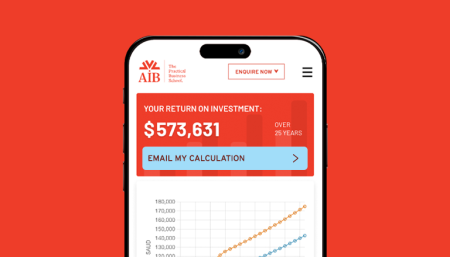What do you need to become a Business Analyst?

When it comes to growing business revenue, data matters. According to Deloitte Access Economics, a mere one-point increase in an organisation’s data maturity score – a measurement of how advanced a company’s data analysis is – can result in a 6.7% revenue increase every year. This could equate to almost $850,000 for the average Australian business.
The issue? Understanding what to do with that data to increase a company’s profits. Not everyone has the ability to understand data and interpret it in a way that results in higher earnings. That’s why most businesses need a business analyst.
The National Skills Commission claims that five out of the top 25 emerging occupations in Australia involve data analytics. This is partly due to the pandemic. While the country was in lockdown, 90% of Australian organisations adopted new technology to stay afloat – for example, moving their business online.
Australian Institute of Business (AIB) is a registered higher education provider that has an array of high-quality tertiary programs for busy working adults, including our Fast-Track MBA. Gain the skills you need to become a business analyst through our flexible and internationally recognised degrees.
Read How The MBA Can Help You Land Your Dream Job.
Are you wondering how to become a business analyst? Read on to find out.
What is a business analyst?
Business analysts are the middlemen between a business and its technical solution suppliers. They work alongside developers to:
- Create documentation and system plans
- Formulate system requirements
- Review existing systems
- Develop and modify systems to suit the needs of the company
They also ensure that projects meet the organisation’s objectives and increase company revenue. Finally, business analysts monitor the progress of their completed projects and provide feedback on what can be improved.
What skills do you need to become a business analyst?
Technical skills
As a business analyst, you’ll need to understand and be proficient in:
- Statistical analysis and database software
- Database querying languages
- Programming skills such as Python
- Survey and query software
- Business intelligence and reporting software
- Data mining, data visualisation and database design skills
- Accounting knowledge
- Financial management skills
Soft skills
Identifying and interpreting data is just one of the many duties of a business analyst. You must also be able to present your findings in a way that profits your company. This requires strong:
- Communication and storytelling skills
- Problem-solving and critical thinking skills
- Organisational skills
- Attention to detail
- Collaboration skills
What is the salary for a business analyst?
According to Seek.com, the average annual salary for a business analyst in Australia ranges from $105,000 to $125,000.
Meanwhile, Talent.com has studied 2,627 salaries to determine an annual average income of $110,050 or an hourly rate of $56.44 per hour. Entry-level positions can start at $99,100 per year, while most experienced workers can make up to $139,739.
Will an MBA increase my annual salary?
In our 2021 MBA Alumni Insights Survey, we found that not only did 73% of all MBA students receive a pay increase since beginning our MBA program, but another 74% increased their salary since graduating from our MBA. On average, this salary increase was $33,000.
How to become a business analyst
Obtain a high-quality, relevant tertiary qualification
Most business analysts have an undergraduate degree in a relevant field such as management, finance or business administration. At AIB, we offer several courses that will boost your career in business analytics.
Master of Management
The Master of Management (MMgt) offers working managers an opportunity to combine an element of coursework at a Master’s level with an in-depth research project. The research undertaken is designed to be useful to your organisation and can be applied to your existing role.
MBA (Finance)
The MBA (Finance) guides you through the universally-used theoretical frameworks and data-driven techniques that are commonly used in modern private sector companies, the public sector, and not-for-profit organisations.
Doctor of Business Administration
The Doctor of Business Administration (DBA) is a research course designed for experienced managers. It offers an opportunity to take your business and management knowledge to a higher level and relate it closely to your industry and practice.
Study the BABOK® Guide
The International Institute of Business Analysis (IIBA) has created the BABOK® Guide, a guide to the business analysis body of knowledge. This manual is recognised globally and also contains all the knowledge, skills, information and most common practices needed to become a business analyst in Australia.
As a budding new business analyst, the BABOK® Guide will become your bible. You can purchase your copy on Amazon or Booktopia. Alternatively, if you’re a member of the IIBA, you can download it for free.
Obtain work experience
If you have no work experience in a relevant field, it’s best to start your new career by applying for an entry-level position. For example, many companies look for recent graduates to fill postgraduate business analyst positions. Once you have enough on-the-job experience, you’ll be able to advance into the role you want.
It’s common for business analysts to start their professional journeys in other analytical entry-level roles – such as data analyst, systems analyst, or financial analyst. So broaden your job search to contain these roles while you work your way to your dream career.
Become a member of the IIBA
Keep your name front of mind of potential employers by becoming a member of the IIBA. This will help you continue to develop and grow your professional networks long after you finish your studies. As a global association for business analysts, the connections and collaborations you make are limitless and open you up to endless career opportunities.
Depending on your level of experience, you can also apply for certifications such as the Certification of Capability in Business AnalysisTM (CCBA®) and Certified Business Analysis Professional (CBAP®). These certifications are recognised worldwide and highlight that you’re experienced and adhere to a specific code of behaviour.
Taking the leap and learning how to become a business analyst will benefit your professional growth and goals for years to come. The AIB offers a wide range of world-class programs, such as the Fast-Track MBA, for working people who want to accelerate their careers. Learn more about our MBA.




